#not really kataang...
Text
Katara's Story Is A Tragedy and It's Not An Accident
I was a teenaged girl when Avatar: The Last Airbender aired on Nickelodeon—the group that the show’s creators unintentionally hit while they were aiming for the younger, maler demographic. Nevermind that we’re the reason the show’s popularity caught fire and has endured for two decades; we weren’t the audience Mike and Bryan wanted. And by golly, were they going to make sure we knew it. They’ve been making sure we know it with every snide comment and addendum they’ve made to the story for the last twenty years.
For many of us girls who were raised in the nineties and aughts, Katara was a breath of fresh air—a rare opportunity in a media market saturated with boys having grand adventures to see a young woman having her own adventure and expressing the same fears and frustrations we were often made to feel.
We were told that we could be anything we wanted to be. That we were strong and smart and brimming with potential. That we were just as capable as the boys. That we were our brothers’ equals. But we were also told to wash dishes and fold laundry and tidy around the house while our brothers played outside. We were ignored when our male classmates picked teams for kickball and told to go play with the girls on the swings—the same girls we were taught to deride if we wanted to be taken seriously. We were lectured for the same immaturity that was expected of boys our age and older, and we were told to do better while also being told, “Boys will be boys.” Despite all the platitudes about equality and power, we saw our mothers straining under the weight of carrying both full-time careers and unequally divided family responsibilities. We sensed that we were being groomed for the same future.
And we saw ourselves in Katara.
Katara begins as a parentified teenaged girl: forced to take on responsibility for the daily care of people around her—including male figures who are capable of looking after themselves but are allowed to be immature enough to foist such labor onto her. She does thankless work for people who take her contributions for granted. She’s belittled by people who love her, but don’t understand her. She’s isolated from the world and denied opportunities to improve her talents. She's told what emotions she's allowed to feel and when to feel them. In essence, she was living our real-world fear: being trapped in someone else’s narrow, stultifying definition of femininity and motherhood.
Then we watched Katara go through an incredible journey of self-determination and empowerment. Katara goes from being a powerless, fearful victim to being a protector, healer, advocate, and liberator to others who can’t do those things for themselves (a much truer and more fulfilling definition of nurturing and motherhood). It’s necessary in Katara’s growth cycle that she does this for others first because that is the realm she knows. She is given increasingly significant opportunities to speak up and fight on behalf of others, and that allows her to build those advocacy muscles gradually. But she still holds back her own emotional pain because everyone that she attempts to express such things to proves they either don't want to deal with it or they only want to manipulate her feelings for their own purposes.
Katara continues to do much of the work we think of as traditionally maternal on behalf of her friends and family over the course of the story, but we do see that scale gradually shift. Sokka takes on more responsibility for managing the group’s supplies, and everyone helps around camp, but Katara continues to be the manager of everyone else’s emotions while simultaneously punching down her own. The scales finally seem to tip when Zuko joins the group. With Zuko, we see someone working alongside Katara doing the same tasks she is doing around camp for the first time. Zuko is also the only person who never expects anything of her and whose emotions she never has to manage because he’s actually more emotionally stable and mature than she is by that point. And then, Katara’s arc culminates in her finally getting the chance to fully seize her power, rewrite the story of the traumatic event that cast her into the role of parentified child, be her own protector, and freely express everything she’s kept locked away for the sake of letting everyone else feel comfortable around her. Then she fights alongside an equal partner she knows she can trust and depend on through the story's climax. And for the first time since her mother’s death, the girl who gives and gives and gives while getting nothing back watches someone sacrifice everything for her. But this time, she’s able to change the ending because her power is fully realized. The cycle was officially broken.
Katara’s character arc was catharsis at every step. If Katara could break the mold and recreate the ideas of womanhood and motherhood in her own image, so could we. We could be powerful. We could care for ourselves AND others when they need us—instead of caring for everyone all the time at our own expense. We could have balanced partnerships with give and take going both ways (“Tui and La, push and pull”), rather than the, “I give, they take,” model we were conditioned to expect. We could fight for and determine our own destiny—after all, wasn’t destiny a core theme of the story?
Yes. Destiny was the theme. But the lesson was that Katara didn’t get to determine hers.
After Katara achieves her victory and completes her arc, the narrative steps in and smacks her back down to where she started. For reasons that are never explained or justified, Katara rewards the hero by giving into his romantic advances even though he has invalidated her emotions, violated her boundaries, lashed out at her for slights against him she never committed, idealized a false idol of her then browbeat her when she deviated from his narrative, and forced her to carry his emotions and put herself in danger when he willingly fails to control himself—even though he never apologizes, never learns his lesson, and never shows any inclination to do better.
And do better he does not.
The more we dared to voice our own opinions on a character that was clearly meant to represent us, the more Mike and Bryan punished Katara for it.
Throughout the comics, Katara makes herself smaller and smaller and forfeits all rights to personal actualization and satisfaction in her relationship. She punches her feelings down when her partner neglects her and cries alone as he shows more affection and concern for literally every other girl’s feelings than hers. She becomes cowed by his outbursts and threats of violence. Instead of rising with the moon or resting in the warmth of the sun, she learns to stay in his shadow. She gives up her silly childish dreams of rebuilding her own dying culture’s traditions and advocating for other oppressed groups so that she can fulfill his wishes to rebuild his culture instead—by being his babymaker. Katara gave up everything she cared about and everything she fought to become for the whims of a man-child who never saw her as a person, only a possession.
Then, in her old age, we get to watch the fallout of his neglect—both toward her and her children who did not meet his expectations. By that point, the girl who would never turn her back on anyone who needed her was too far gone to even advocate for her own children in her own home. And even after he’s gone, Katara never dares to define herself again. She remains, for the next twenty-plus years of her life, nothing more than her husband's grieving widow. She was never recognized for her accomplishments, the battles she won, or the people she liberated. Even her own children and grandchildren have all but forgotten her. She ends her story exactly where it began: trapped in someone else’s narrow, stultifying definition of femininity and motherhood.
The story’s theme was destiny, remember? But this story’s target audience was little boys. Zuko gets to determine his own destiny as long as he works hard and earns it. Aang gets his destiny no matter what he does or doesn’t do to earn it. And Katara cannot change the destiny she was assigned by gender at birth, no matter how hard she fights for it or how many times over she earns it.
Katara is Winston Smith, and the year is 1984. It doesn’t matter how hard you fight or what you accomplish, little girl. Big Brother is too big, too strong, and too powerful. You will never escape. You will never be free. Your victories are meaningless. So stay in your place, do what you’re told, and cry quietly so your tears don’t bother people who matter.
I will never get over it. Because I am Katara. And so are my friends, sisters, daughters, and nieces. But I am not content to live in Bryke's world.
I will never turn my back on people who need me. Including me.
#ATLA#Avatar the Last Airbender#Katara#Anti Bryke#Zutara#but not really#just pro-Katara#Anti Kataang
2K notes
·
View notes
Text
the anti-Zutara criticism that “Zutara shippers are teenage girls who only like the ship because they self-insert as Katara” is actually so funny because how does that delegitimize the ship? So…girls who relate to Katara like Zuko, and they think Katara would like Zuko, and that’s bad because…girls are wrong? Girls are shallow? Girls don’t know what’s good for them?
Anyway if I were a grown ass man who created a fictional teenage girl that lots of real teenage girls relate to, and these girls believe she would like character B instead of character A, I hope I’d have the humility to say to myself “hmm I wonder why people who relate to this character’s feelings and motivations think she would react this way” instead of jumping straight to “these girls are doomed to like toxic relationships”
(And I know Zutara shippers like the ship for many different reasons, and self-insert is not the most popular by a long shot, I’m just saying that the criticism of self-insert stems from dismissal of what teenage girls like, and that feels kinda misogynistic to me)
#Zutara#pro Zutara#anti bryke#katara#Anti kataang#not really anti kataang but tagging it just in case#I should tag this “pro teenage girls”#My meta
977 notes
·
View notes
Text
i feel like the reason aang isn’t as adored and beloved as he should be is because he’s the protagonist but he’s also not an archetypal western classical hero. i don’t agree with the entirety of that “avatar aang: feminist icon” essay because i think the role of patriarchy and gender in atla is more complex than what that essay posits, but he definitely complicates the masculine ideal of heroism and generally does not conform to patriarchal notions of masculinity. which is very deliberate, especially as contrasted with sokka and zuko’s explicit struggles with the imperialist/colonial standards of an aggressive, militaristic, and chauvinistic masculinity. aang is subversive because he represents an absence of war in a world ravaged by it. through his link to a (somewhat more) peaceful and harmonious past, he represents a better possible future. as katara would say, he brings people hope.
but people don’t like that he’s not visibly edgy or tormented like zuko is (even though he’s a far more tragic character than zuko is, just fyi), that he isn’t “cool” (even though he’s literally the coolest kid ever, just fyi), that he “gets the girl” (even though if anything, she gets him) despite being twelve and bald and nice (the horror!). katara is the more classical hero of the narrative, as its narrator and its catalyst, the adventurous revolutionary who gradually learns to control and use her powers and eventually becoming a force to be reckoned with. zuko is the classical anti-hero of the narrative, his “redemption arc” constantly hailed as one of the greatest character arcs in television. so people expect katara and zuko, as very obvious narrative foils who parallel each other every step of the way, to be the obvious couple, because based on every romance narrative we’ve been inundated with throughout our lives, within our patriarchal society, they “just make sense together.”
but as much as katara is a protagonist in her own right, aang is the show. the title quite literally represents the central thematic tension of the entire narrative, the colon illustrating the implicit divide between his duties to this brave new world in desperate need of justice and balance, or his duties to his extirpated culture as the last true voice among them. aang is the central figure because this tension represents the crucial ideological battle happening across the entire show. aang is the avatar because he is the only person in the entire world whose values have not been shaped by war.
people constantly laud zuko, in particular, for being the most interesting, complex character in avatar. but i personally don’t even think that’s true. which isn’t to say that zuko isn’t fascinating in his own right, of course, but rather that he’s certainly not the only complex character this show has to offer. he just happens to monologue about his anguish constantly. but aang wasn’t raised as an imperial prince, and so he approaches the world, and his own pain, in a very different manner. the reason he immediately goes to ride giant koi on kyoshi island, mailchutes in omashu, and otherwise goofs around after learning of the shocking ramifications of his people’s genocide is because that’s how he copes with his pain. unlike zuko, who never stops talking about his aches and yearnings, aang represses his trauma and hides his tears behind a mask of upbeat cheerful goofy twelve year old antics.
until he can’t anymore. until he snaps. both katara and zuko wear their hearts on their sleeves, and that includes their rage. but aang’s rage is dangerous specifically because it represents that he has been pushed past his limits, that the conditions of this world in which he is a perpetual stranger, temporally displaced and dispossessed, are intolerable. that peaceful reconciliation is impossible. and the fact that he persists beyond that breaking point, over and over again, to firmly and resoundingly establish his ideals even as they conflict with everything he has learned about this world, a world that is not his own even as he can never return to the world he once knew, is what makes him so unique, so powerful, so beautiful.
i know that aang isn’t the typical hero, neither narratively nor aesthetically, but really, that’s the entire point. the world, our world, needs something other than what we have now. we need someone who will not succumb to the ideals of domination and victory through violence to assert themselves. we need someone who stands firm in refusing to kill the firelord, even as everyone he knows tells him otherwise. we need someone who knows that darkness cannot be vanquished through more darkness, but can only truly yield to purifying light.
and sure, aang is a child, and often acts childishly. sure, he’s not conventionally handsome and alluring. but one thing i will never understand is how that somehow negates his appeal to the masses. because even if you don’t appreciate how crucial he is to the themes of this narrative you all seem to love so much, how can you not love his adorable little face? his precious little laugh, his zest for life, the infinite well of love and kindness he holds in his heart? people who hate aang are crazy to me. because you are, quite literally, hating the world’s most precious baby boy.
#aang#katara#zuko#analysis#hot takes#sorry this one is kind of all over the place#very stream of consciousness bc it’s loving aang hours#and he’s not only meaningful narratively#but he’s also just SOOOOO CUTE#I would literally pay money to babysit him#which I think defeats the point of babysitting but whatever#he’s just. so precious 😭😭😭#also fwiw I don’t really fw kataang either but like. it does make more narrative sense than the alternative#and if it had been executed better . well. who can say
1K notes
·
View notes
Text

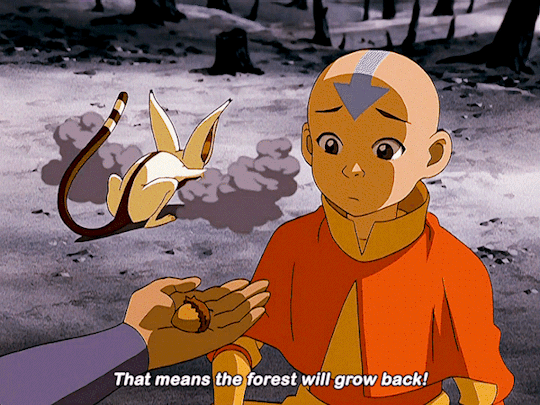

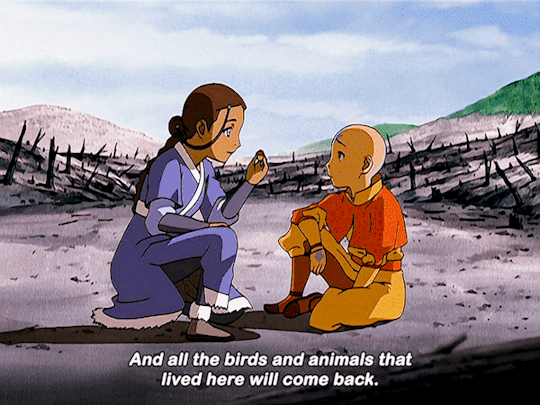
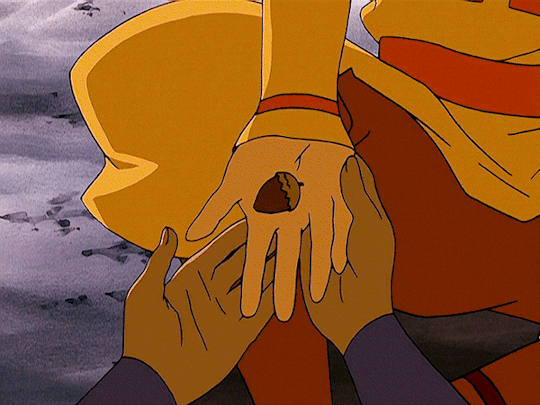
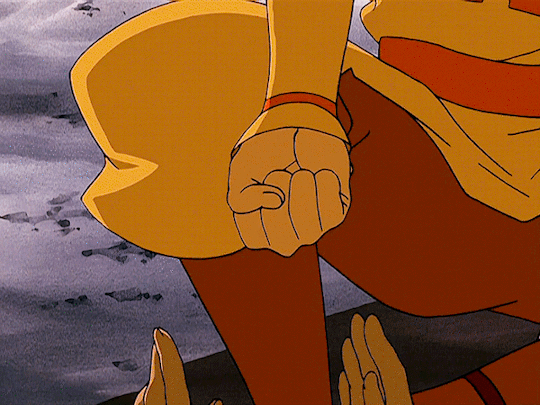

Mal's Avatar: The Last Airbender rewatch: The Spirit World (Winter Solstice, Part One) 1.07
#atlarewatch#avatar the last airbender#atla#katara#aang#kataang#gifs#avatarthelastairbenderedit#atlaedit#kataraedit#aangedit#kataangedit#useramys12#tusersimone#userthing#smallscreensource#this scene changed me as a kid#really gave me renewed hope for the environment
221 notes
·
View notes
Text
Let's Talk About How Book 3 Ruined Aang
If you've seen any of my prior ATLA posts, you know that I don't hate Aang. In fact, I quite liked him in Books 1 and 2. He was flawed, as all characters should be, but the show didn't shy away from those flaws or justify them. He was called out for burning Katara and rushing his firebending, Sokka and Katara were rightfully upset when he hid Hakoda's letter, he willingly owns up to the fact that his actions helped drive Toph away, and his entire arc after losing Appa and finding hope again in The Serpent's Path was beautifully done.
(Hell, even in The Great Divide Katara says what Aang did was wrong and he agrees. It's played for comedy, but the show still makes the effort to point out that what he did wasn't the right thing to do. You're just meant to understand that he was fed up and acted off of that)
Those flaws and mistakes were addressed and improved upon and helped Aang to grow as a character.
But for some reason, that aspect of Aang's character was completely flipped in Book 3.
The best examples of this are in both TDBS and EIP. Both the show and the fandom are too quick to brush off that Aang kissed Katara twice without her consent, one of which after she explicitly said she was confused about her feelings.
(And yes, she is angry in response and Aang calls himself an idiot. But after this, it isn't really addressed. They go on like nothing happened for the rest of the episode. Aang's lamentation comes from screwing things up with her romantically, not that he violated boundaries)
The show never really addressed why what he did was wrong. Not only because he wasn't given consent, but also because both times he isn't thinking about what Katara wants. In both instances, Aang is only thinking about himself and his feelings. This is something that persists through a lot of the third book. And by Sozin's Comet it ultimately ruins any character development he had built up in the second book.
One thing I feel was completely disregarded was the concept of having to let go of Katara in order to master the Avatar State.
For me, the implication wasn't that he had to give up love or happiness necessarily. He was emotionally attached to and reliant on Katara, to the point where she was needed to stop him from hurting everyone around him and himself. This is obviously detrimental to his functionality as the Avatar. And the point of him "letting her go" wasn't that he had to stop caring about her, it was that his emotional dependency on her was stopping him from being the Avatar he needed to be and that was what needed to be fixed. I don't even think it's about the Avatar State itself, it's about being able to keep your emotions and duty as the Avatar separate.
(If you look at Roku, he loved and had a wife. It wasn't his love for her that messed everything up, it was his attachment to Sozin. He wasn't able to let Sozin go and not only did he lose his life for it, the world suffered for it. It's the unhealthy attachments that seem to be detrimental, not love itself)
And Aang realizes that in the catacombs, which is how he's able to easily enter the Avatar State and seemingly control it. He let Katara go.
So then why does it seem like his attachment to Katara is not only stronger, but worse in mannerism? He liked Katara in Books 1 and 2- obviously- but he was never overly jealous of Jet or Haru. He only makes one harmless comment in Book 2 when Sokka suggests Katara kiss Jet.
But suddenly he's insanely jealous of Zuko (to the point of getting frustrated with Katara over it), off the basis of the actions of actors in a clearly misrepresentative play. Katara showed a lot more interest in Jet and Aang was completely fine with it.
(Speaking of EIP, Aang's reaction to being played by a woman was interesting. He wore a flower crown in The Cave of Two Lovers. He wove Katara a flower necklace. He wore Kyoshi's clothes and makeup and made a funny girl voice. He willingly responded to Twinkle Toes and had no issue being called that. And for some reason he's genuinely upset about being played by a woman? Aang in Books 1 and 2 would have laughed and enjoyed the show like Toph did. His aversion to feminity felt vastly out of character)
I guess my point is, why did that change? Why was Aang letting go of Katara suddenly irrelevant to the Avatar State? It felt like him letting go was supposed to be a major part of his development. Why did that stop?
Myself and many others have talked about The Southern Raiders. The jist of my thought process about it is his assumption that he knew what was best for Katara. And the episode doesn't really call out why he was wrong. Maybe sparing Yon Rha was better for Katara, maybe it wasn't (the only one who's allowed to make that choice is her). Pushing forgiveness? That was wrong. But the episode has Zuko say that Aang was right when the course of action Katara took wasn't what Aang suggested.
Katara's lesson here was that killing him wouldn't bring back her mother or mend the pain she was going through and that Yon Rha wasn't worth the effort. That's what she realizes. Not that she needed to embrace forgiveness. How could she ever forgive that? The episode saying Aang was right wasn't true. Yes she forgives Zuko, but that wasn't what Aang was talking about. He was specifically talking about Yon Rha.
And that was wrong. Aang can choose the path of forgiveness, that's fine. That's his choice. But dismissing Katara's trauma in favor of his morals and upbringing wasn't okay.
I know it sounds like this is just bashing Kataang. But it's not simply because I don't like Kataang, in my opinion it brings down Aang's character too, not just Katara's. But let's steer away from Kataang and Katara for a minute.
The one thing that solidifies Aang's character being ruined in Book 3 for me is the fact that he- at the end of the story- does the same thing he did in the beginning.
He runs away when things get hard.
Aang couldn't make the choice between his duty and his morals. So he ran. Maybe it wasn't intentional, but subconsciously he wanted an out. And this is really disappointing when one of the things he was firm about in Book 2 was not running anymore. His character went backwards here and that's not even getting into the real issue in Sozin's Comet.
There's been contention about the Lion Turtle intervention. For many- including myself- it's very deus ex machina to save Aang from having to make a hard decision. And that in turn doesn't reflect kindly on his character.
Everyone- Sokka, Zuko, Roku, Kyoshi, Kuruk, and Yangchen (who was another Airbender and was raised with the same beliefs he was and would understand which was the whole point of him talking to her)- told him he had to kill Ozai. They all told him it was the only way. And he refused to listen to any of them, rotating through his past lives until he was given the answer he wanted.
And before anyone says that I'm bashing Aang for following his culture, I'm not. Ending the war peacefully, in my opinion, wasn't the problem. In a way, I think it allowed the world to heal properly. However, that doesn't make up for the fact that Aang refused to make a choice and face the consequences of that choice. Instead, he's given an out at the very last second.
Even if he couldn't kill Ozai and someone else had to deliver the final blow, that would have been better than the Lion Turtle showing up and giving him a power no one's ever had before. It would have been a good compromise, he doesn't have to have blood directly on his hands but what needs to be done needs to still get done. It would also show that being the Avatar isn't a burden he has to bear alone. That when things get hard, he can't run away but he can rely on the people closest to him to help him through hard decisions.
All these issues aren't necessarily a problem with Aang. Aang prior to Book 3 didn't have most of these problems. This is a problem with the way he was handled
#aang critical#anti aang#tagging just in case#i don't want aang stans accusing me of cross tagging#it's really not anti aang tho#long post#anti bryke#this is their fault#look how they massacred my boy#anti kataang#katara deserved better#she's not the focus here#but i thought I'd add that there#character analysis#atla critical#anti book 3#which is kind of an exaggeration#because a lot of book 3 is great#it's just most of the latter half
221 notes
·
View notes
Text
I'm seeing so much commentary on people reacting to the live action atla toning down Sokka's misogyny
and I'm over here like this is a total non-issue because in my own rewrite of the show I already did that exact thing, it makes complete sense to do it and they should do it because it's a weaker aspect of the original show
Sokka's early misogyny is utterly cartoonish in comparison to the set up of the rest of the SWT, it doesn't feel realistic for the only teenaged boy in a dying culture surrounded by adult women with a grandmother who left a more out and out misogynist society to act the way he does
how Sokka "resolves" his misogyny is equally cartoonish, I never liked how in The Warriors of Kyoshi literally episode 4 of the show makes a teen girl compromise her own culture with a female only fighting tradition teach a boy who is supremely rude and disrespectful to her and then still be attracted to him afterwards, it's more misogyny to fix misogyny and is very obviously men writing about how to fix misogyny especially as they have Aang make a joke about Sokka wearing a dress after going through how meaningful the fighting costume is and how a lot of Asian clothing with hanfu influences like atla borrows from would have men in what to western eyes would be dresses, Aang has already seen multiple male authority figures in robes, the joke makes no sense
I also wouldn't consider Sokka's misogyny genuinely resolved after this, consider how the show deals with his romantic relationships with both Yue and Suki and how both can be seen as extensions of how Kataang is treated in the show, rewards for the hero, especially with how Sokka interacts aggressively with Hahn instead of respecting Yue's wishes whatever her reasons for them, I think an argument can be made that Yue's death is a fridging for Sokka's storyline rather than or in combination with being a consequence of Aang's failure as an avatar or the culmination of her own storyline where she fulfills her duties as a leader to protect her own people
Beyond his romantic relationships, while Sokka drops a lot of his more misogynistic language with Katara, he doesn't support her when she faces off with the NWT leaders to learn waterbending, and he still leaves the caretaking and food preparation and grocery shopping to her which is more common than him going out to hunt or gather in order to provide for the group while he takes a leadership role like determining their travel schedule and routes, it is not an even division of labor and falls along traditional sex stereotypes
In addition to his typical duties to the group, Sokka also remains invested in the trappings of masculinity after ep4, he's concerned about what's manly and how he compares to Jet for example, there's no investigation or interrogation in his interest in meat and hunting and how they relate to masculinity and his misogyny, in the episode with Piando, his insecurity as a non-bender is resolved by giving him a new male mentor and a new martial skill, sword fighting, which is masculine in both western and Asian cultures rather than assuaging his self esteem issues in any less stereotypically masculine ways, I also think it was done so he could compare more favorably to Zuko, another male character, and even his interest in engineering and mechanics comes with a male mentor and is a traditionally masculine pursuit
the show's poor handling of misogyny also extends beyond Sokka, with the NWT, the show acts as if Pakku is the only reason the tribe is misogynistic and the only consequences to that misogyny is that women can't waterbend and there are arranged marriages, and that both the NWT and Pakku's misogyny is resolved by allowing only Katara to learn to waterbend which she doesn't even earn on her own merits, she gets the opportunity because Pakku likes her grandmother
none of this is realistic, misogyny is not because of one bad apple, Pakku doesn't make Yue's arranged marriage, Chief Arnook does, he picked Hahn for her, and the show acts as if Arnook has no authority to compel Pakku to teach Katara or any ability to persuade him in order to reduce his culpability in the NWT's misogyny as its leader to make him a more respectable character so it's not uncomfortable when Aang and Sokka follow his orders in the battle later on, but women not being able to bend and forced into arranged marriages is still status quo when the gaang leaves, Yue's just dead
I'm not even convinced the show runners understand what's wrong with arranged marriage, the issue is not Yue can't be with Sokka who she likes and at most has a slight crush on cuz she's only known him for like two days, it's that she's being treated as male property, a broodmare, and a vehicle to ensure Hahn receives the throne because her father has no male heir and picked some guy to succeed him instead, like it's not explicit in the show but that is the implication based on the historical reality of princesses in arranged marriages, and the show has her get out of it only through death idc that she ascends to being a spirit, it's still a teen girl that dies
There's also no discussion by the show of the Earth Kingdom's misogyny when it has the exact same shit going on, Toph is the only female earthbender in the show not including avatars, there might have been a female earthbender in the background when Katara broke them out of prison, but I'm not really counting that, the entire army and Dai Li are all made up of men, the EK might even be worse because the show doesn't demonstrate that women and girls even have the capacity to earthbend aside from Toph and avatars and Toph doesn't even learn from a human, she has to learn from animals, the show treats this as commentary on her disability but the show has no compelling reason why it can't also be commentary on her sex, Toph was also originally supposed to be a boy so this could have ended up so much worse there literally would have been no female earthbenders aside from avatars at all, I'm not counting Oma as she might just be a mythological figure not a real person that once lived
The Fire Nation kinda barely avoids the same issue, Azula is the only named female firebender aside from avatars in the show but she has two female sidekicks who despite being non-benders show martial skill and there are clearly female soldiers and guards in the FN military so there are much stronger implications of female firebenders existing and being completely allowed to train their abilities and that Azula isn't exceptional in that respect like Toph is, only for being a prodigy with blue fire
Azula was also originally supposed to have an arranged marriage in s3 and they dropped it in favor of showing that royal and noble girls could casually date in the FN which has wild implications for women's empowerment in the country more so than but especially in combination with the fact women can train and join the military (which is why I say the FN is not fascist it's literally the least misogynistic country aside from Kyoshi and by like a country mile so it's literally not misogynistic enough) not that the show does anything more than minor teen drama with it
again, the vast majority of this misogyny is completely unremarked upon by the show especially after s1 when they leave the NWT, it is clearly a fictional world made by men with no true understanding of misogyny just a vague awareness that misogyny is bad and what the really obvious and outdated examples of it are, this is a narrative inconsistency in the show to have the examples and commentary on misogyny be so cartoonish in the beginning and then disappear after s1
your options to resolve this inconsistency is to either go all in with more realistic misogyny and provide commentary on all of it but this takes effort and will be divisive, or take the easier route and ease off the cartoonish-ness of it and comment less on it to avoid drawing attention to all instances of misogyny in the show
obviously Netflix was gonna do the latter
(not me tho, I'm making it less cartoony and dealing with it in my rewrite)
#atla#live action atla#atla critical#anti bryke#anti kataang#anti sokka#its not really anti him more anti how his character was written and dealt with#long post#meta
381 notes
·
View notes
Text

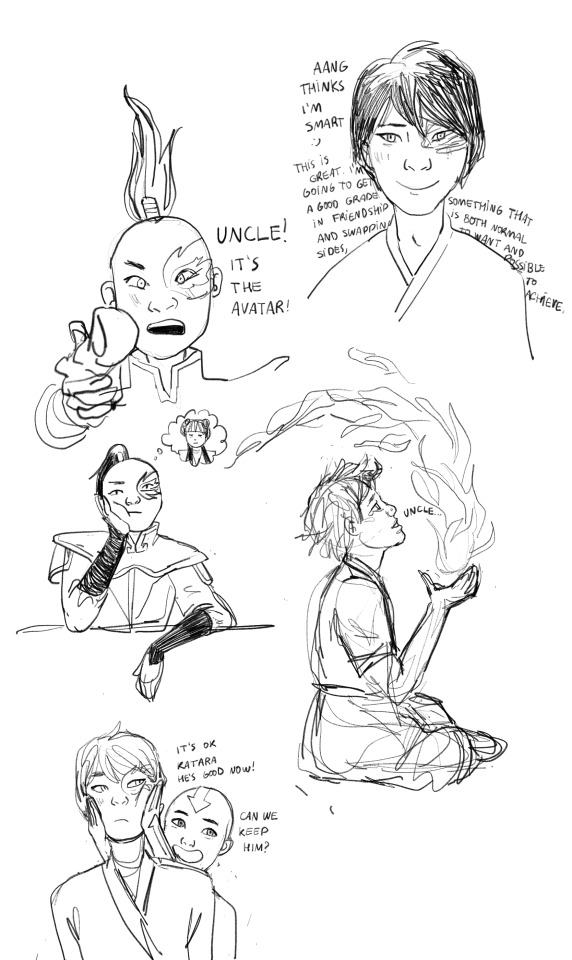

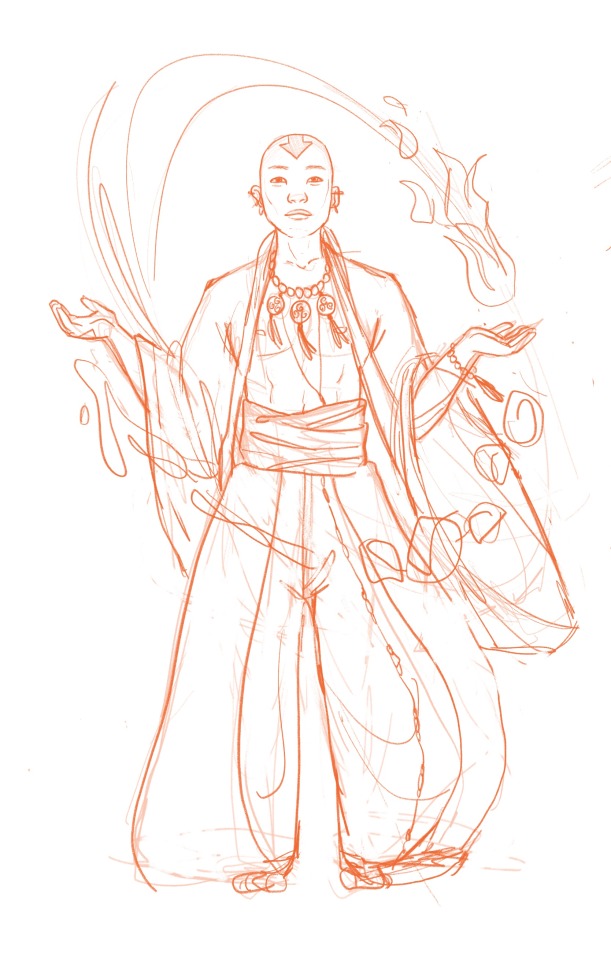
evidence dump of the brain altering that rewatching atla for the first time as an adult has caused in the past few weeks
#atla#avatar: the last airbender#aang#katara#zuko#kataang#tiny bit of maiko#kataang kiss on the cheek for katara seeing as she's always the one kissing on the og#kisses for this girl#i love zuko#you get a good grade in redemption mr hotman#an sleek adult aang reminding everyone he doesnt eat meat. like me#an buff aang is his loose robes phase i needed to see it#i love aang#too much for my own good#sketches#gurinillustratesatla#avatar the last airbender#i'm sorry this blog has really derailed as a themed blog i'm sorry
279 notes
·
View notes
Text
I know that people say Kataang was not developed, but as someone who watched the show for the first time this year, I think it was obvious since the beginning from both sides.
I also find a little sexist how one of the arguments against the shipp is that Katara is more like Aang's mom or sister simply because she is very protective of him. I don't know, but I think defending someone you love is important in a romantic story.
#kataang#katara x aang#aang x katara#atla#avatar the last airbender#i really don't get the hate they just like each other :/
370 notes
·
View notes
Text
As a kataang girlie myself, seeing so many zutara shippers saying they hope it becomes canon in netflix atla makes me sad for them. Like, girl, you deserve better.
#idk maybe that's my Canon Privilege talking#avatar the last airbender#atla#netflix avatar#netflix atla#kataang#also i say this out of care pls don't attack me i know what this fandom can be like#like netflix atla isn't horrible but the characterizations are still weak in a lot of respects#i don't really want kataang OR zutara to become canon frankly
244 notes
·
View notes
Text

zutara bait 2024...
and ok but lmao please look at some of the quotes and viral hate tweets please they are so funny. they are so mad and screaming their ship is canon. ok?? i just know these people are so jealous and insecure about this scene. it made much more noise than anything katara was doing with aang in the LA. like, yes, imagine your ship being canon and no one giving a fuck 😭
stay happy and in your lane with your little animated canon. now it's time for true love (live action zutara)
#zutara#anti kataang#i guess but not really... i don't enjoy talking shit about other ships that much but my god they are so insufferable !!
210 notes
·
View notes
Text
Why I feel like Ka/taang is one-sided, despite textual evidence
ATLA does try to convince us that Katara has romantic feelings for Aang. For example: she seems thoughtful when she realizes that Aang is a powerful bender; she’s offended that he didn’t want to kiss her in the Cave of Two Lovers; she gets jealous when Sokka says On Ji and Aang look good together.
So…what’s wrong with anti-Kataangers? Do we just lack media comprehension?
To be clear, on their own, these gestures can indicate romantic interest. But at the same time, we have stuff like “Aang is a sweet little guy, like Momo.” We have her ambivalent facial expression after he kisses her before the eclipse, and her hedging during Ember Island Players, and her anger when he kisses her anyway. In the context of these conflicting cues, Katara’s possibly romantic reactions can absolutely be interpreted in a different way, because:
Acknowledging a friend as a potential romantic interest is not the same as actually being romantically interested in them. (Imo this is something young women struggle with, due to a combination of romance-centrism and heteronormativity that make women feel like they should be in romantic relationships, and that boys and girls who share intimate and deep feelings for one another must be romantically into each other)
Wanting someone to find you desirable is not the same as desiring that person. (Which is something a lot of women, especially young women, struggle with. Remember all the discourse around Cat Person back in 2017?)
Being jealous when someone flirts with your friend is not the same as wanting to be with your friend. (Especially when you see your friends as family, or if you’re accustomed to a specific type of devotion from that friend. It is jealousy, and it is possessiveness, but it doesn’t always arise from romantic feelings)
Growing up in a patriarchal society means that your desires are always filtered through what men want from you, sometimes in an abstract male gaze-y way, and sometimes in a very visceral and interpersonal way when a boy wants you specifically. And Katara’s reactions are just that — reactions. Reactions to what other people — including Aunt Wu, Sokka, Aang himself — have insinuated about her and Aang. She’s not really proactive in her interest in Aang: we don’t really see Aang, romantically, from Katara’s POV. Under the framework of “Katara is reacting to a romantic prospect she’s kind of uncertain about,” it is completely plausible — and indeed likely — that she would sometimes act in ways that indicate romantic interest, in addition to moments where she indicates the opposite.
Ka/taang shippers often bring up other evidence, like Katara’s despair when Azula hits Aang with lightning, or how protective she is of him when Zuko joins the Gaang. The thing is, these pieces of evidence aren’t necessarily indicative of romantic love. The fact that Katara genuinely loves Aang makes the whole thing more complicated, not less, because — especially at that age, especially when Aang is twelve years old and grew up in a sex-segregated society of monks — it is really difficult to tell the difference between platonic love and romantic love. Their mutual devotion is layered and complex yet straightforward in its sincerity. What was not straightforward, until the last five minutes of the show, is whether this devotion on Katara’s end is romantic. The romantic arc for Katara and Aang is not really an arc, as Sneezy discusses in this classic ZK video. Katara actually becomes more conflicted over time and we never see an event that clarifies her feelings. She seems more interested in him in The Headband than on the Day of the Black Sun, and she has never been more hostile to his romantic overtures than in the penultimate episode.
And in light of this, it’s pretty easy for fans to fill in the blanks with a different interpretation: maybe Katara’s weird expression after their kiss at the invasion means she didn’t enjoy it; maybe the kiss made her realize that she doesn’t actually feel that way about Aang; maybe against her will and her better judgement, she’s developing feelings for another person, a person who hurt her and whom she fervently tried to hate until he pulled off what is in my opinion the greatest grovel of all time in the form of a life-changing field trip. Maybe. Am I saying that Zutara has more romantic interactions than Ka/taang? Of course not. But ironically, the lack of romantic interactions means that it’s not inherently one-sided, the way Ka/taang became in the latter half of season 3.
I’m not arguing that Katara’s unequivocally not into Aang. Obviously the text declares that she is, because they get married and have kids. But I am saying that there’s a very good reason that so many people, especially women, see Katara’s interest in Aang as ambiguous. It’s not because we can’t pick up “subtle” hints of growing affection. It’s because we know not all affection is romantic, and it’s really easy for someone else’s insistent romantic intentions to muddle what you want.
P.S. I first started thinking about these topics (platonic vs romantic love, desiring someone vs wanting to be desired, etc) in the context of compulsory heterosexuality, a term describing how queer women contort themselves into relationships with men even if they’re not really into men. I saw a post a few days ago joking about why so many queer women seem to be into Zutara. I wonder if part of the reason is because as queer women, we are very sensitive to the ways in which we can talk ourselves into wanting things we don’t actually want, and Katara’s romantic interest in Aang can be easily seen that way.
#Anti Kataang#Zutara#anti Bryke#Katara deserved better#From Bryke who offered her so little romantic agency#I actually think Aang and Katara’s mutual devotion is really compelling because the wires get crossed when you have such intense love#And navigating romantic vs platonic feelings can be very complicated and interesting#but no we did not get that bc I guess they just had to end with a romance however shoddily developed#my meta
381 notes
·
View notes
Text
Can we please stop with the takes that Zutara shippers dislike Aang with Katara because he’s “feminine” just please, that’s embarrassing.
Aang isn’t “feminine.” He’s 12. The traits people point to as “feminine” are him simply acting his age.
#And quite frankly (cartoon) Aang really starts displaying some stereotypically (toxic) masculine traits in later seasons.#atla#zutara#anti kataang#aang critical
149 notes
·
View notes
Text
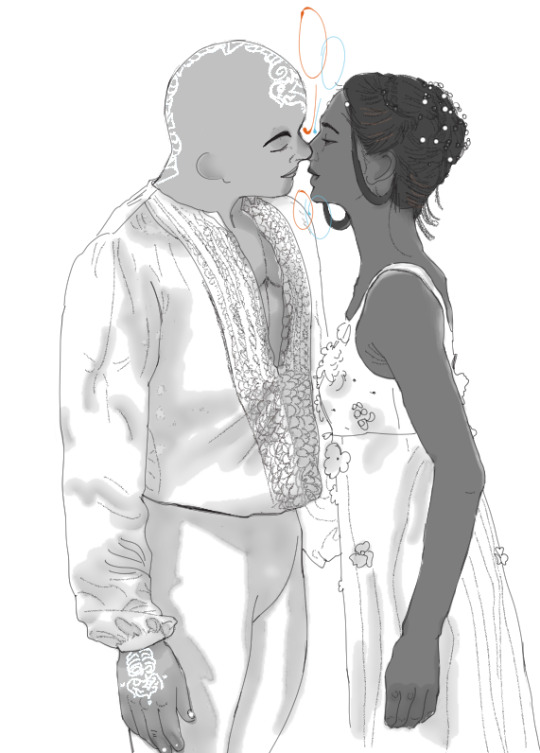
Kataang Week DAY 3 // Confessions & Whispers
Wanna get out of here?
#kataangtag#katara#aang#kataang week 23#kw23#kataang#again shoutout to heyhanibee’s raava tattoo design that really put the battery in my back#ykw speaking of battery in my back I saw a post yesterday where op said ‘why did I say this like a 74 year old’ and I was like OH GOD#I speak so ELDERLY why didn’t y’all say anything am I a joke to you?! XD but speaking elderly is fun man#My next experiment will be focused on their fashion! I’m really interested in subtly weaving in the culture#kataracies#my art
155 notes
·
View notes
Text


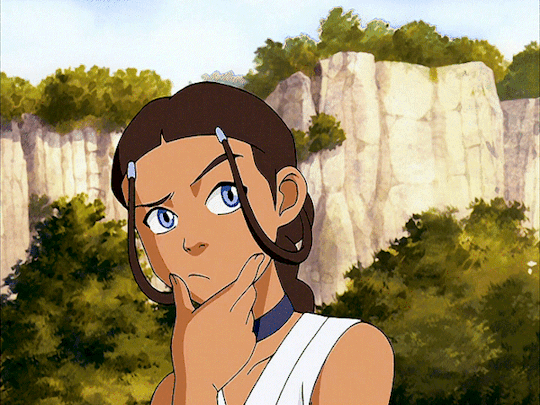
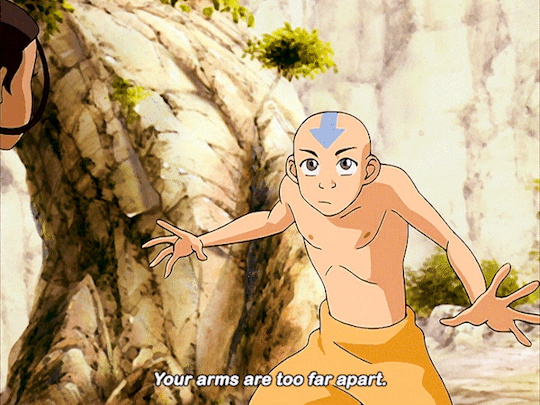

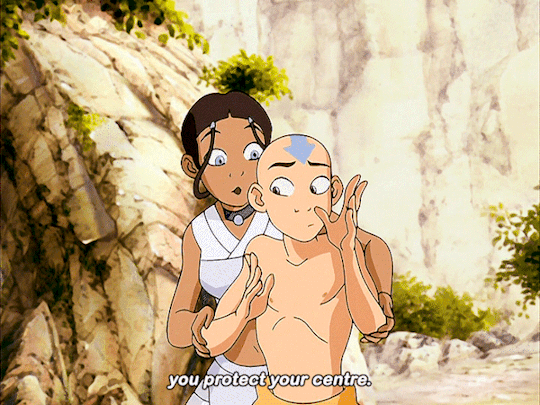
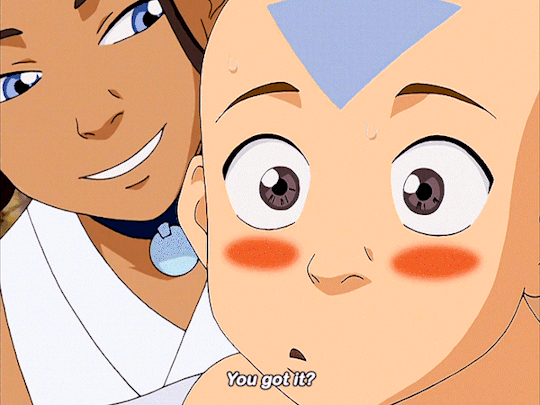


Mal's Avatar: The Last Airbender rewatch: The Cave of Two Lovers 2.02
#atlarewatch#avatar the last airbender#atla#katara#aang#kataang#gifs#avatarthelastairbenderedit#atlaedit#kataraedit#aangedit#kataangedit#userthing#smallscreensource#userotp#useramys12#tusersimone#choosing which moment to gif from this episode was really hard cause it's just soo hilarious and iconic#definitely one of my absolute favorites#but i ultimately settled on this one cause i don't think i've ever seen the gender switched version of this trope anywhere else??#kataang continues to be iconic
131 notes
·
View notes
Text
most zutara shippers: it’s true that zuko and katara were not canonically confirmed to have romantic feelings for each other, but a romance between them would have been narratively satisfying (even more so than their canon relationships) given the progression and resolution of their individual arcs as well as the development of their relationship over the course of the series. additionally, there are several scenes between zuko and katara that are coded using film language and tropes audiences usually recognize as romantic, and which can therefore be reasonably viewed as romantic subtext. thus, though there is no explicit proof that zuko and katara are in love, neither is this conclusion an invalid interpretation of where the source material was leading based on the narrative and visual techniques utilised to depict the relationship between these two characters. for these reasons, zutara would have been the better choice of relationship from a writing standpoint.
what zutara antis seem to hear, somehow: zuko and katara should be together because they obviously wanted to bump uglies from the moment they set eyes on each other. also fuck aang, we want him to die alone in a sewer in a steaming pile of bison shit :)
329 notes
·
View notes
Text
Okay but some of the k.ataang crowd is already complaining about how katara looks to big compared to Aang in the trailer. And already hating it. Wow it’s surprising that a 12 year old boy and a 15 year old girl are different sizes crazy.
#zutara#anti kataang#the live action Atla looks nice#I’m hopeful#I really hope they give katara and aang a real friendship#it would be cute#and apparently im the toxic shipper
245 notes
·
View notes